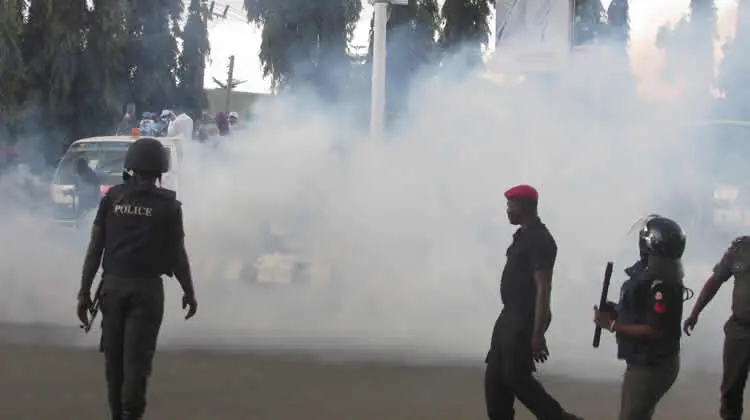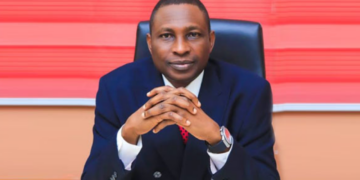Recent events in Nigeria’s political and social landscape are beginning to raise critical questions about the state of democracy in the country. From state governments imposing bans on public rallies to the intimidation of citizens exercising their rights to free speech, the constriction of democratic space in Nigeria is becoming an increasingly pressing issue.
While governments justify these actions by citing security concerns, these measures often come at the expense of political freedoms and civil rights. The examples of the Kogi and Beyelsa State Governments banning public rallies and the controversial actions surrounding the youth corps member, Ushie Uguamaye, reveal the troubling trend of diminishing space for opposition and free speech.
In Kogi State, the government’s decision to ban rallies and public gatherings following alleged security reports is emblematic of a broader trend where governments across Nigeria stifle the opposition. While concerns about insecurity are valid in a country often plagued by violence and insurgencies, such measures seem to disproportionately target opposition voices.
The timing of the ban, coinciding with the homecoming ceremony of Senator Natasha Akpoti-Uduaghan, a suspended lawmaker and a known opponent of the powers that be at the state, raises questions about whether these security concerns are a genuine threat or a convenient pretext to suppress dissent, especially as state government officials have been accused of orchestrating the now failed effort to recall her from the Senate.
Similarly, in Bayelsa State, the government imposed a ban on a planned rally to honour former Rivers State Governor and FCT Minister Nyesom Wike, ostensibly to avoid further political turmoil between Wike and his successor, Siminalayi Fubara, which has spilled over into Bayelsa. Governor Douye Diri expressed concern that such a rally would exacerbate the political tensions between the two neighbouring states, which could potentially disrupt the peace in Bayelsa.
While Governor Diri emphasised his respect for fundamental human rights and the constitutional right to assembly, his refusal to allow the rally—especially at a time when the political crisis in Rivers was intensifying, raises concerns about how state governments sometimes curtail freedoms to protect their political interests.
Diri’s argument that holding rallies could be “unwise” at a time when political tensions are high, sounds reasonable on the surface. However, this reasoning often blurs the line between maintaining public order and suppressing political expression.
One of the most unsettling examples of the constriction of democratic space is the case of Ushie Uguamaye, a National Youth Service Corps (NYSC) member based in Lagos, who went viral after criticising President Bola Tinubu’s government over Nigeria’s worsening economic conditions. In a TikTok video, Uguamaye expressed frustration over rising inflation, increasing food prices, and the general economic hardship faced by young Nigerians.
While Uguamaye’s expression was a valid criticism of the state of the economy, it quickly attracted threats and condemnation from various quarters, including government officials and supporters of the administration. Uguamaye’s apology, which she issued after facing pressure from the authorities, vividly illustrates how the government attempts to silence critics and undermines the very democratic principles the country purports to uphold.
To ensure that Nigeria’s democracy remains robust and vibrant, it is essential to restore and protect the freedoms of assembly, speech, and the press. These are internationally recognised fundamental rights considered inalienable. While security concerns are valid, they should not be used as an excuse to limit political discourse and curtail democratic rights. The government must find a balance between maintaining public order and respecting the rights of its citizens to express their views, assemble peacefully, and participate in political activities.
In our opinion, banning rallies and restricting free speech only exacerbate tensions, creating a breeding ground for social unrest. Instead, the government should focus on addressing the root causes of discontent, such as economic instability, corruption, and human rights abuses.
We need to point out that this phenomenon did not begin under the present administration. Even during the general elections in this political dispensation, many of the state governments rolled out directives that made it extremely difficult to communicate their own ideas to the people of the state, often shutting them out of access to public spaces and media.
In one extreme case, a state governor ordered the destruction of road infrastructure leading to the district of an opposition candidate. During the ongoing political crisis in Rivers State, the House of Assembly complex was pulled down after the lawmakers began a democratic exercise of trying to impeach the governor.
The growing trend of constricting the democratic space in Nigeria is deeply disconcerting. President Bola Ahmed Tinubu is one of the notable figures in the June 12 struggle to send the military back to the barracks and restore democracy to Nigeria, even suffering a life in exile in the process. So, if there is anyone who understands democratic freedom, he is one. So, it behooves on his administration to ensure that the democratic rights of the Nigerian people are respected and protected.
Whether through banning rallies, restricting media freedom, or intimidating citizens who voice legitimate concerns, these actions threaten the very foundation of democracy.
Nigeria must prioritise protecting the rights of its citizens to freely express themselves, engage in peaceful protests, and participate fully in political life without fear of repression. Only through such protections can the country truly call itself a democratic nation.





